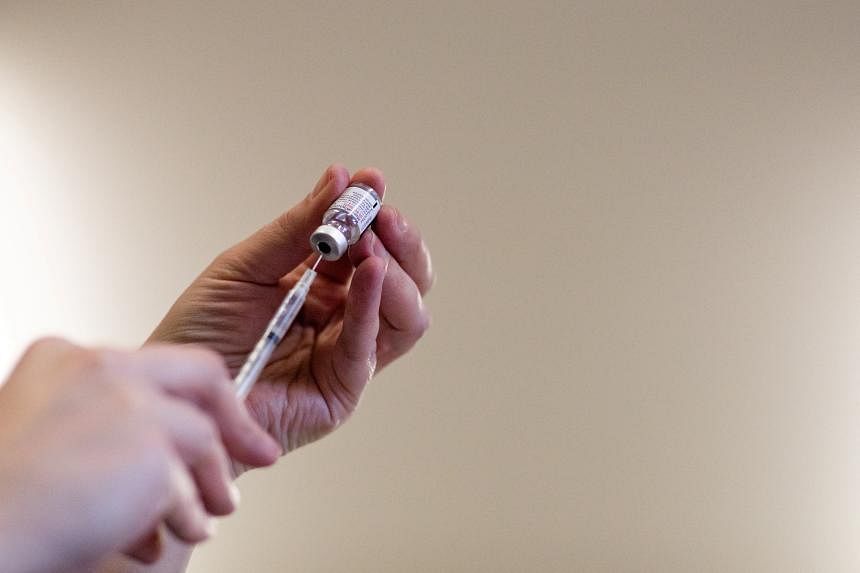NEW YORK – Two new Covid-19 shots have received the green light from the US Food and Drug Administration. The Centres for Disease Control and Prevention (CDC) is expected to follow up with guidance on eligibility as soon as Tuesday, making the new vaccines from Pfizer-BioNTech and Moderna available as Covid-19 cases continue to rise in some parts of the United States.
Although the numbers of Covid-19 hospitalisations and deaths have slowed over the last year, the virus has evolved and mutated into more than two dozen different variants. Most people’s immunity has also waned.
Less than 20 per cent of Americans received the previous booster – a bivalent shot that arrived last autumn and was designed to protect against the original virus as well as Omicron sub-variants BA.4 and BA.5. While some parts of the immune system have long memories, the antibodies that help prevent infections decrease significantly in a matter of months.
The reformulated Covid-19 shots can better help fight off the latest set of sub-variants circulating in the US. Here is what to know:
How are the new Covid-19 shots different from the last ones?
Unlike the bivalent shots from last autumn, the latest mRNA vaccines developed by Pfizer-BioNTech and Moderna are monovalent, meaning they are designed to protect against just one variant: XBB.1.5, a recent descendant of Omicron that emerged earlier in 2023.
While XBB.1.5 is no longer the dominant circulating version, preliminary research has shown that the new jabs should nonetheless offer protection against the variant EG.5, which is currently dominant, as well as other variants that have raised some concern among scientists, such as BA.2.86.
Data from a handful of academic labs suggests that patients infected with XBB.1.5 who had yet to receive the vaccine had developed enough neutralising antibodies to “adequately handle” current versions of the virus, according to Dr David Ho, a virus researcher at Columbia University.
“We believe that would be equivalent to getting the XBB.1.5-based vaccine,” he said.
Pfizer-BioNTech and Moderna have also announced that, according to their initial research, the new Covid-19 vaccines provide good protection against both EG.5 and BA.2.86. Regulators will also consider a third monovalent shot developed by Novavax against XBB.1.5. The Novavax shot is protein-based, meaning it works differently from an mRNA vaccine.
The new shots do not include protection against the original virus, which may actually help broaden protection against new variants.
“Our immune system, when we have seen something, is biased to seeing that again,” Dr Ho said. “So if you include the original components, the immune system will react mostly to the original components and not to the new version of the virus.”
Initial data from preprint studies has suggested that the bivalent formula from 2022 was no more effective against BA.4 and BA.5 than the original vaccine it replaced because of this so-called “immune imprinting” bias.
When will the new Covid-19 vaccines be available?
The CDC’s director, Dr Mandy Cohen, could sign off on the new boosters shortly after the advisory meeting on Tuesday and millions of doses could be available within days.
US government to urge Americans to get new Covid-19 boosters
US FDA authorises updated Covid-19 shots from Pfizer-BioNTech and Moderna
How much will the new Covid-19 shot cost?
In the beginning of the pandemic, the US government bought hundreds of millions of vaccine doses and distributed them for free.
But now, the cost of the reformulated shots will be negotiated by private insurance companies and government payers like Medicare. The vaccines will likely remain free for most people with private or public health insurance – as long as they get them through an in-network provider.
Those who are uninsured may be able to get the new Covid-19 shots for free at community health centres. Additionally, vaccine makers are expected to donate doses for the uninsured. A government “bridge” programme may also help provide access to the vaccines, at least till 2024.
WHO warns of ‘concerning’ Covid-19 trends ahead of winter
US CDC says new Covid-19 lineage could cause infections in vaccinated individuals
Who should get the new Covid-19 booster?
The CDC is set to determine eligibility on Tuesday. It seems likely that the new shots will be authorised for everyone six months old and up, though the roll-out may target those at high risk of severe disease first, including people aged 65 and older as well as those who are immunocompromised or have serious underlying medical conditions.
Can you get the Covid-19 booster and flu shot at the same time?
Yes. Just as they did in 2022, US federal officials plan to urge people to get their shots at the same time. Research has shown that the Covid-19 and flu vaccines are safe to get together, as are the flu shot and respiratory syncytial virus (RSV) shot for older adults.
There is not yet sufficient data on pairing the RSV vaccine with the Covid-19 shot. But experts are hopeful that combining the vaccines will make it easier for more people to get protected, Dr Ho said. NYTIMES
New Covid-19 vaccine on the way as ‘Eris’ variant on the rise in US
US CDC says existing antibodies can work against new Covid-19 variant
Join ST’s Telegram channel and get the latest breaking news delivered to you.
p.st_telegram_boilerplate:before {
display: inline-block;
content: ” “;
border-radius: 6px;
height: 6px;
width: 6px;
background-color: #12239a;
margin-left: 0px;
margin-right: 13px;
}
a.st_boilerplate {
font-family: “SelaneWebSTForty”, Georgia, “Times New Roman”, Times, serif;
}


